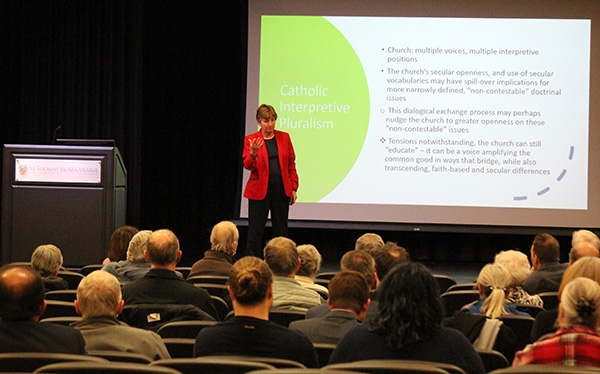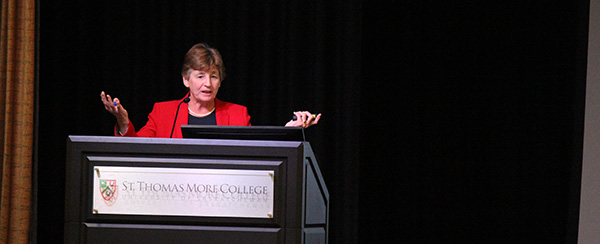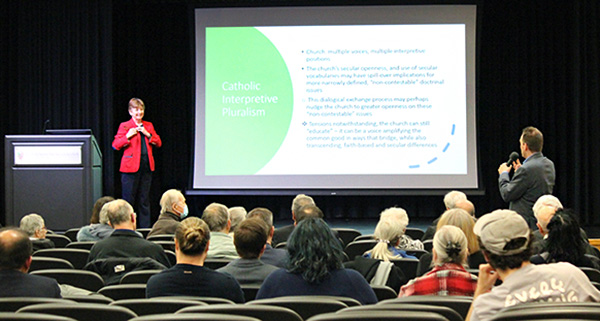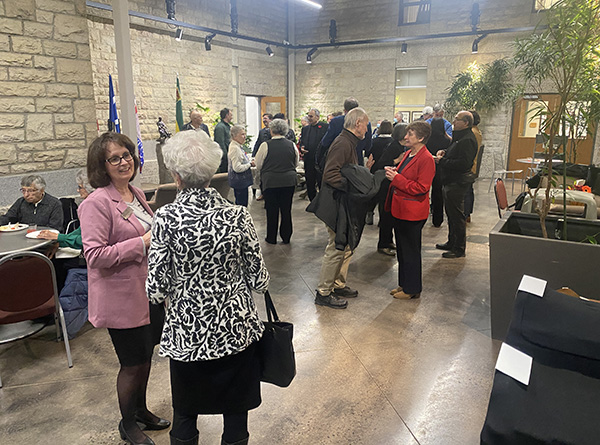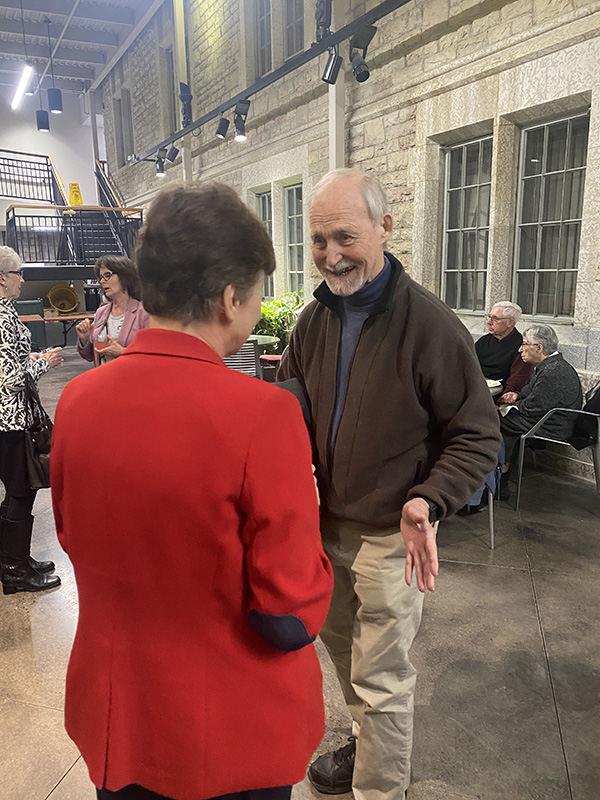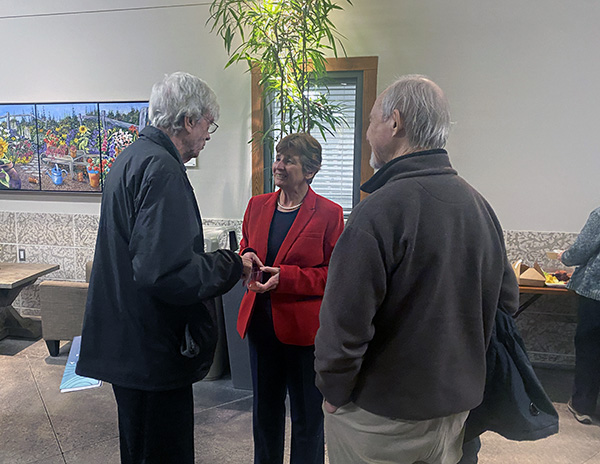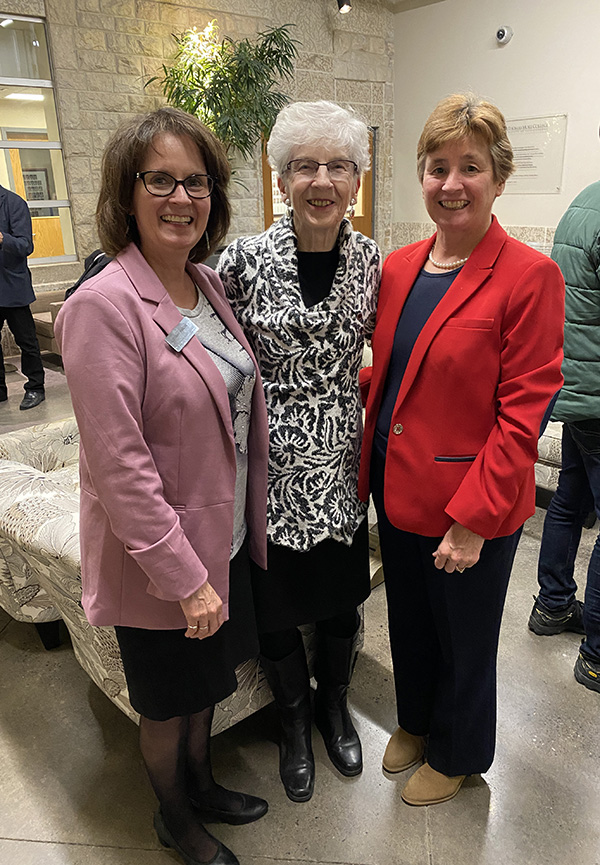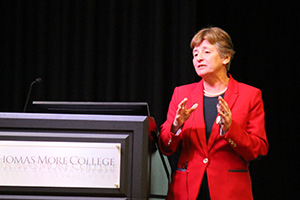
Church has key role in promoting common good in modern times
Dr. Michele Dillon delivers 2023 Keenan Lecture; focuses on postsecular landscape
By Paul Sinkewicz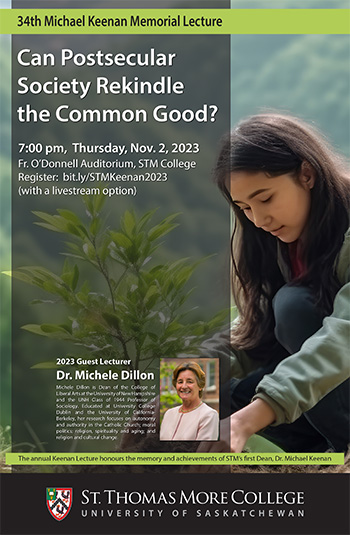
St. Thomas More College presented the 34th Annual Michael Keenan Memorial Lecture on Nov. 2, with Dr. Michele Dillon asking: Can Postsecular Society Rekindle the Common Good?
The annual lecture was established to commemorate the life of Dr. Michael Keenan, the first dean of STM, who served from 1975-1985. It features leading intellectuals and leaders in various fields.
Dr. Dillon is Dean of the College of Liberal Arts at the University of New Hampshire and the UNH Class of 1944 Professor of Sociology. Educated at University College Dublin and the University of California-Berkeley, her research focuses on autonomy and authority in the Catholic Church; moral politics; religion, spirituality and aging; and religion and cultural change.
The readiness to tackle the immense challenges that mark our current era are severely undermined by the political polarization that is so dominant, said Dr. Dillon.
She gave as an example the issue of climate change. The belief that it represents a significant threat can largely be predicted by one’s political leaning in major countries around the world.
“You can see this (split) for all kinds of other issues as well,” she said. “One’s leanings does matter as to how you perceive the world. The idea that we may be able to discover an overlapping consensus on climate change, or any of the other issues that are increasingly pervasive and increasingly visible may, in fact, seem a little bit naïve particularly given the rise of neoliberalism, the declining significance of the state even in societies where it had a much more proactive and communal role and that sometimes it seems today that the idea of individual and social well-being – never mind the notion of the common good – is a little old fashioned. And so tonight what I’m hoping to do is rekindle your interest in the common good.”
She said the notion of the common good is a central tenet to Catholicism, and it is defined as the sum total of social conditions which allow people either as groups or as individuals to reach their fulfillment more fully and more easily.
The idea of the common good has been elaborated publicly by papal and cyclicals going back to the late 19th century. Church leaders have had an emphasis on this no matter the topic being considered.
“Really it’s an emphasis on the inherent dignity of the individual and that each individual really has to be treated with all the due respect that inheres in their God-given inalienable rights,” Dillon said.
She spoke of worker rights, access to education, health care, political stability and security and the promotion of peace as consistent themes, and said while it’s everyone’s duty to promote the common good, Catholic teaching tends to see a special emphasis on the role of the state in doing so, and of social institutions more generally.
In her conclusion, Dr. Dillon said she believes the Church does have postsecular credibility.
“It has a long history of commitment to the common good. But not just an articulated commitment to the common good. There’s actually a lot of consistency in this regard between the Church teachings on the common good and its own activism, its own actual institutional practices on social justice broadly defined and then in more recent years on environmentalism.”
Dr. Dillon said the data shows that religion does still matter in individual lives, as well as institutionally in the way that the Church is involved in education, health care and other social supports.
“What I like about the postsecular is it recognizes that we live in a secular society – that’s the operating mode, is that it’s secular – but nonetheless religion really does matter in a positive way.”
“Religion has this ethical voice that transcends political and religious partisan interests.”
She said Pope Francis exemplifies the postsecular society we now live in.
“He doesn’t necessarily think of himself as a postsecular thinker or actor, but all of his major encyclicals are on things that are about the world.”
He has really been focused on social justice, looking at poverty and climate change.
“He’s really saying ‘I’m bringing the secular into my arguments, and you need to bring the religious ethics I’m articulating into your discussion to find a way forward.”
To watch the 34th Annual Keenan Lecture on YouTube
